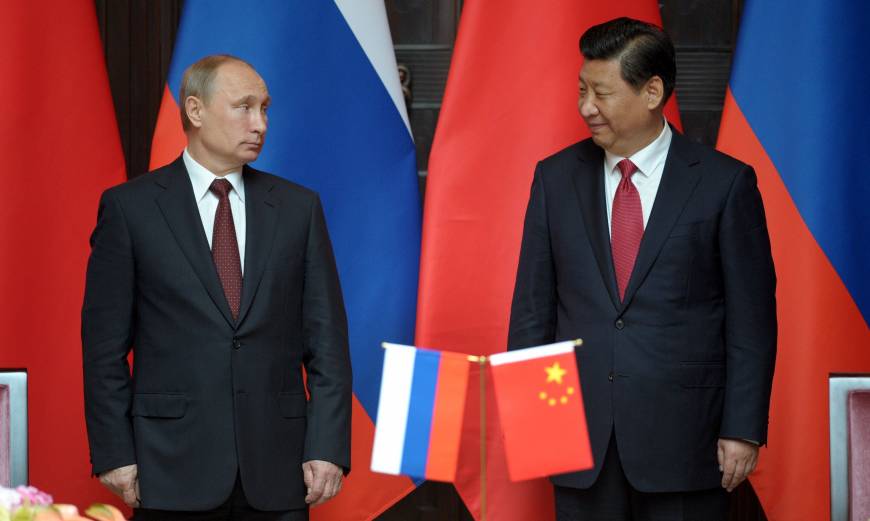
THE MAIN EVENT
Presidents Xi and Putin meet in Moscow

Chinese President Xi Jinping arrives in Moscow today for talks with Vladimir Putin. Expectations are high ahead of the two-day state visit—Putin has said it will be “the year’s major event in bilateral relations,” a sentiment echoed by China’s ambassador to Russia.
The two will likely discuss geopolitical issues, including North Korea—Russia claims to have a strategy to get Pyongyang to dismantle its nuclear program. Military cooperation will be on the agenda, Moscow and Beijing having launched joint naval exercises in the Baltic Sea last week.
China is also Russia’s largest trading partner; trade between the two has grown a third since January. Greater Russian involvement in China’s Belt and Road Initiative could be on the table, a Chinese state-owned firm having recently inked a deal to build a 200 kilometre high-speed rail link between the Russian cities of Yekaterinburg and Chelyabinsk.
The two presidents will head to Hamburg Thursday for the G20 Summit. There, they may get a frosty reception from Western leaders, spooked by their increasing military links. But at least one Western leader should be pleased to finally meet Putin—Donald Trump.
SQUEEZING THE OPPOSITION
Prominent Egyptian politician on trial for ‘indecent act’

Egyptian opposition politician Khaled Ali will face court today for ‘violating public morals’. The charge stems from allegations that Mr Ali, a lawyer, raised his middle finger in public after a Cairo court upheld his challenge to the government’s transfer of two Red Sea islands.
A former presidential candidate, Ali is expected to run again in 2018. But because Egypt’s electoral law disqualifies those sentenced for “crimes that undermine honour”, a guilty verdict would undermine his chances.
Human rights activists have alleged that Ali’s prosecution is politically motivated and part of a larger crackdown by President Abdel Fattah al-Sisi’s administration on potential rivals. At least 35 other political activists from five opposition parties have already been arrested, several for the crime of ‘misusing social media platforms’ or posting political comments online.
Other opposition leaders, such as Hamdeen Sabahi, have called for competing opposition groups to unite against Sisi’s government. But their ability to enact change will be limited by Cairo’s restrictions on freedoms of political expression.
A CLOSER (AND MORE POPULOUS) UNION
African leaders discuss continental issues in Addis Ababa

African leaders meet in Addis Ababa, Ethiopia today for a two-day African Union summit.
The meeting follows Friday and Saturday’s talks by the AU’s executive council, which announced plans to boost intra-African trade to 28% by 2021, double its current figure. This move fits with the AU’s ultimate goal of a European Union-esque common market with free movement of workers.
The leaders will have to consider obstacles to their dream of a common market. For example, they must contend with the lack of intra-continental visa-free travel (Africans need visas to travel to 54% of African countries on average) and long stalled plans for a single African currency to ease cross-border trade.
The main theme of the summit, however, is “Harnessing the Democratic Development through Investments in Youth.” Africa must cope with a projected explosion in population—quadrupling to 4.5 billion by 2100. In response, the AU leaders appear more focused on job training for the young than curbing birth rates. With population growth that rapid, more comprehensive solutions are needed.
HAPPENING ELSEWHERE…
The ten-day deadline for Qatar to meet 13 demands from the Saudi-led bloc expires at the end of Monday. Saudi Foreign Minister Adel al-Jubeir insists that the demands, which include shuttering Al Jazeera and cutting ties with the Muslim Brotherhood, “are non-negotiable”; Qatar has repeatedly refused to meet them. The stalemate suggests Qatar’s isolation will continue over the short-term—new pressure points could also be exploited. Meanwhile, Kuwait and the US continue efforts to mediate between the two sides in a bid to prevent the anti-Iran GCC from fracturing completely.
Former Italian PM Silvio Berlusconi will face court on charges of bribery. Mr Berlusconi is accused of paying more than $11 million to witnesses who testified in his favour during a trial that alleged he had sex with a minor. The former PM was initially convicted to seven years in prison but later successfully appealed. Despite this, the 80-year-old continues to lead Forza Italia—Italy’s third most popular political party.
French energy giant Total and China National Petroleum Corporation are expected to sign a $4.8 billion contract with Iran to develop the South Pars gas field. The deal will be the largest with foreign firms since the majority of economic sanctions were lifted in 2016. Since then, Iran’s oil exports have risen by a third. While gas production is expected to surpass neighbouring Qatar in March 2018, Iran’s 80 million people consume much of the hydrocarbon, leaving little for export.
The EU and Mercosur—comprised of Argentina, Brazil, Paraguay and Uruguay—will begin the next round of negotiations on a free trade deal. The EU accounts for more than a third of Mercosur’s foreign investment. In a busy week for EU trade negotiators, the bloc is expected to sign a broad-ranging trade agreement with Japan on Thursday, which will slash European tariffs on Japanese-made cars and allow unrepentant access to the Japanese market for European farmers.

